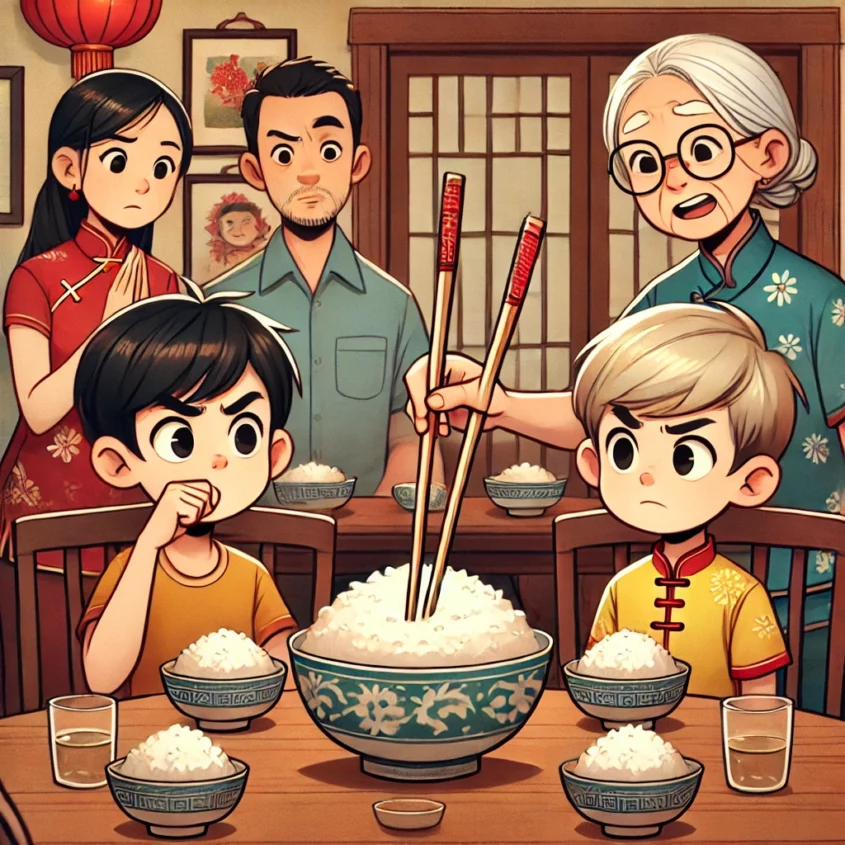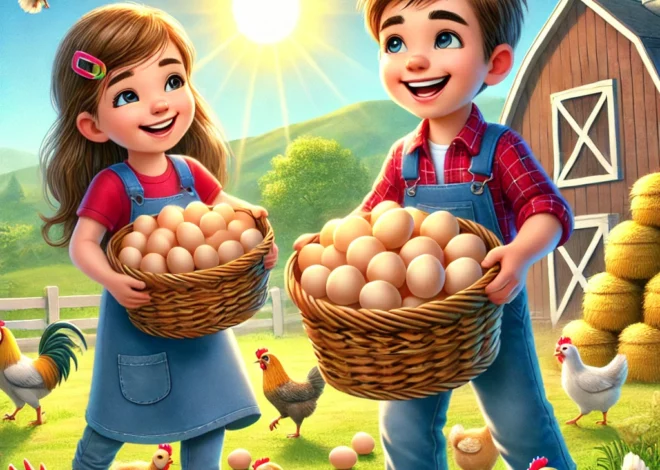
The Chopstick Etiquette
On evening, the Chen family gathered around the dinner table for a delicious meal. Grandmother Chen had prepared a feast of stir-fried vegetables, steamed fish, and a fragrant bowl of rice. The family chatted happily, enjoying the warmth of being together.
As everyone settled in, 8-year-old Ash, one of the mischievous twins, stuck his chopsticks upright in his bowl of rice. He giggled, thinking it looked funny. But as soon as Grandmother Chen saw it, her face turned serious.

“Ash!” she exclaimed, her voice filled with concern. “Never stick your chopsticks upright in a bowl of rice. It’s very bad luck.”
Ash looked puzzled. “Why, Grandma? It’s just chopsticks.”
Grandmother Chen sighed, her expression softening. “In our culture, sticking chopsticks upright in rice resembles the incense sticks used at funerals to honour the dead. It’s like inviting bad spirits to join us at the table.”
The room fell silent as everyone listened. Father Chen, always eager to bridge tradition and modernity, nodded. “It’s important to respect these customs, Ash,” he said gently.
Ally, the curious 11-year-old, leaned forward. “Grandma, can you tell us more about dining customs and why they matter?”
Grandmother Chen smiled warmly, happy to share her knowledge. “In Chinese culture, dining customs are a way to show respect and maintain harmony. For example, we never point chopsticks at someone, as it’s considered rude. And when taking food from a shared dish, it’s polite to use the serving utensils instead of your own chopsticks.”
Alex, Ash’s twin brother, asked, “What other customs should we know?”
“Well,” Grandmother Chen continued, “it’s also important not to tap your chopsticks on the bowl. It’s something beggars do to attract attention, so it’s seen as impolite. And never cross your chopsticks, as it resembles a symbol of death.”
The children listened intently, absorbing the new information. Ally, ever the adventurer, decided to take this as a learning opportunity. “Let’s make sure we follow these customs from now on,” she suggested. “It’s a way to honour our heritage and show respect.”
Over the next few days, the Chen children became more mindful of their dining manners. They practiced holding their chopsticks correctly, refrained from pointing or crossing them, and always used serving utensils for shared dishes. Their efforts made Grandmother Chen proud, and she praised their respect for tradition. “You know, it’s not just about avoiding bad luck. These customs help us connect with our roots and remind us of the importance of respect and harmony.”
Ally nodded, adding, “And it’s fun to learn about these traditions. It makes me feel closer to our culture.”
Grandmother Chen beamed. “I’m glad to hear that. Our traditions are a treasure, and it’s wonderful to see you all embracing them.”
From that day on, the Chen family continued to enjoy their meals together, always mindful of their chopstick etiquette and the deeper meaning behind their customs. The children learned that respecting traditions was more than just avoiding bad luck—it was about honouring their heritage and strengthening their family bonds.

Editor’s Note : Superstitions
https://onestoryeveryday.com/tag/superstitions/
Are you fascinated by the mysterious world of superstitions and the rich cultural heritage that shapes them? Continue reading our series on Superstitions and embark on an unforgettable journey through the fascinating realm of ancient beliefs and modern-day wonders.
Click HERE for more adventures with the Chen family!


